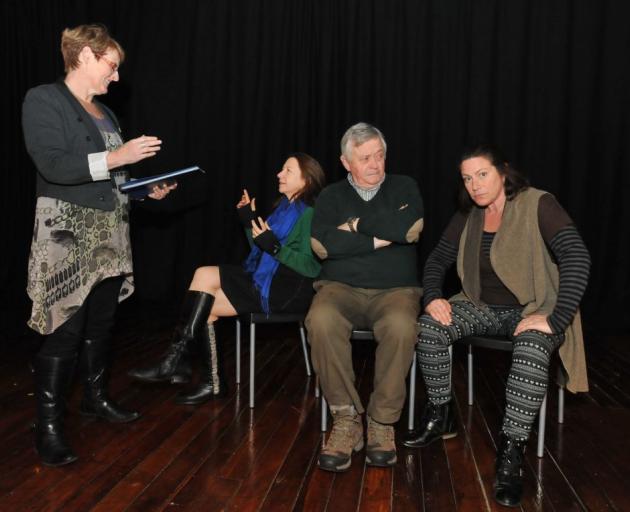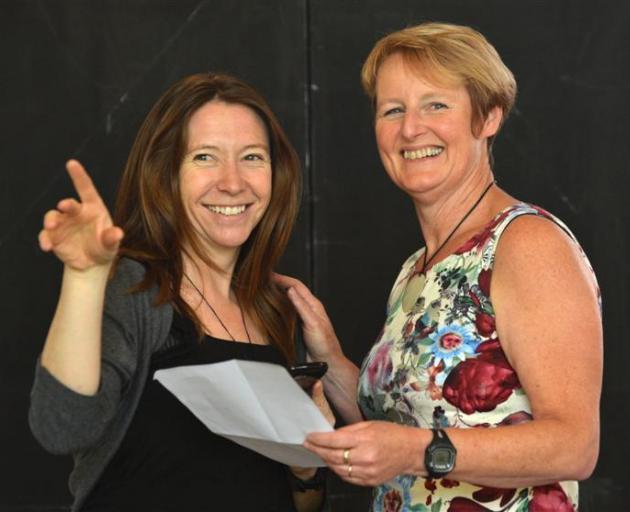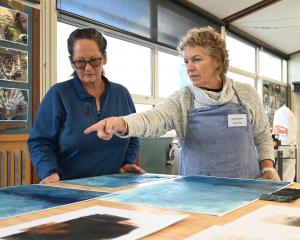
Many of us fear dementia, for either ourselves or our family members, but few of us know much about it. However, a new verbatim play, The Keys are in the Margarine, exploring the stories of Dunedin people and their families living with dementia, aims to give some insight. Charmian Smith reports.
Dunedin GP Susie Lawless and theatre practitioner Cindy Diver hope their project exploring dementia will get people to think and talk about it.
Their verbatim play, The Keys are in the Margarine, opens at the Fortune Studio on Thursday, June 19.
They met five years ago when Diver interviewed Dr Lawless for Hush, a verbatim play about family violence.
''It wasn't until I actually saw that staged that I saw what a powerful medium it was and how good it would be to tell stories. At the time, we talked about the possibility of doing something in the future about dementia,'' Dr Lawless said.
They have been working on the project for 18 months, first sorting ethical and consent processes, then interviewing people connected with dementia.
''There are interesting ethical and consent issues with people whose memory is not intact and who can't necessarily remember what they are consenting to,'' she explained.
The Alzheimer's Society put the pair in touch with families from different socioeconomic groups and religious beliefs who had a member with dementia and they interviewed them, as well as with staff working in secure dementia care units, doctors and researchers.
All of them said they wanted to blow open the stigma associated with dementia and its most common form, Alzheimer's, Dr Lawless said.
Verbatim theatre allows people to tell stories that would be too exposing on film or other media.
For Diver as a documentary theatre maker, the important thing was to relay the intimate stories they were told as truthfully as possible.
''As an actor you create, but the real strictness of this form of theatre is that you can't create. You have to try as truthfully as possible to replicate every hand gesture, every eye movement, every body posture. All that is part of what they are trying to tell you, so you are getting the intonations, the breathing, and you are trying as much as possible to tell the real person's story without them having to take the risk of being in the hot seat,'' Diver said.
''One of the really interesting things when you sit down with someone and say 'tell us about your experience of memory loss', they can't because they can't remember forgetting, so to actually explore their experience involved quite creative interviewing. Their support people a lot of the time helped trigger stories and reminded them of events they could still talk about,'' Dr Lawless said.
There were interesting moments when the carer would say something and the person with dementia would say ''I've never done that'' and the carer would say ''Yes, you did. You used to be able to do that.''
Two of the interviewees are in the early stages of dementia, an older woman who is able to talk about the issues and her coping strategies and a younger man in his early 50s whose Alzheimer's is progressing fast but who is still able to tell his story.
Six years from diagnosis he has started losing his visual spatial ability, spilling his drinks because he can't hold a cup level, and he can't manage a knife and fork, she said.
People with different types of dementia presented differently.
Those with Alzheimer's often retained a little more insight into their forgetting, whereas people with frontal lobe dementia had no idea there was anything wrong with them because they couldn't process the information.
To hold in your mind that you are losing your mind was almost an impossibility, she said.

The big question they asked all the interviewees was whether the person with dementia was still the same person they were before.
Are we our memories and when they are gone, is that person still there?
''We got a really big range of answers to that, and it seemed to depend partly on the type of dementia the person had, and also the individual and their experience. Some people said no, that person had gone and they were not there any more. Another person said 'my father was a very driven man and now he's much easier to love','' Dr Lawless said.
Unexpected things came through the interviews, such as the loneliness of a man whose wife was in dementia care.
He talked about being a widower but not a widower.
He was still there for her but was constricted by the fact that he didn't want to move on and re-engage with the world.
A woman who was caring for her husband with Alzheimer's spoke about its effects on their relationship and sexuality.
She'd taken on a maternal role looking after him, so she was more a mother and carer than a wife and also felt he wasn't her husband any more, so when he wanted to have sex with her she faced an emotional dilemma.
Some of the saddest stories were about realising it was no longer safe to have the person with dementia at home and they had to go into full-time care, Diver said.
''No-one wants to let go of their family member and nobody wants to send them there, but we also had this beautiful member of staff from one of these secure rest-homes talk to us about what it's like when they get there. They speak with such love and affection and humour about the people they are looking after.''
By the time the person goes into full-time care, the carer has probably been working the equivalent of three shifts a day, especially as people with dementia often don't sleep, and wander around at night trying to do things, such as lighting fires, she said.
Often the carer became weak and frail with the work and responsibility and when they fell sick or went into hospital, things fell apart.
There were many stories that the problem was recognised or the illness fell to a new level when the environment changed in some way or there was illness or injury, Dr Lawless said.
''People going travelling was the classic story. We must have heard half a dozen stories about people who went overseas and their partner was getting lost or putting the passports in the wastepaper bin because they thought they weren't important any more as they'd used them, forgetting what country they were in, not being able to adapt to the new money, all the things they would have done really easily in the past. Without many preliminary symptoms, taking someone out of their own environment and travelling was a trigger to actually recognising there was a problem,'' she said.
''Of course, if you've lived in the same house for 30 years, you know your way around. You can rely on your old memories and you don't need to create new memories to function, so new environments are often a trigger.''
Many people have a benign forgetfulness, which is fine as long as they are not getting into trouble and their lives are ticking along fine.
But sometimes you don't realise how impaired they are until you actually start investigating and doing tests.
People can be quite astonishingly impaired and still functioning in their own home, but you recognise they are at risk at some point and you need to do something, Dr Lawless said.
It's often a family member who notices the problem first and tells the GP they are worried about their partner or parent.
The person may be asking the same question five times over, or become uncharacteristically antisocial, or have paranoid thoughts that aren't part of their usual personality, or other personality changes; and even sleep disturbance can be an issue, she said.
''But what is really important is that a lot of those are also symptoms of depression or physical illness, so getting an assessment to see if this is truly a problem of the brain or if this person is actually physically or mentally unwell with a psychological problem and it's treatable.''
"A lot of people may have these symptoms but they don't necessarily mean they have Alzheimer's disease or other dementia.''
Forgetfulness can be a simple factor of growing older and many people needlessly worry they are losing their memory when really it's just their brain isn't 20 any more, she said.
One of the things I was grateful to hear, especially from our researcher, was that there are things you can do - the idea of keeping young and the placebo effect of behaving like you are still capable of doing things and keeping your brain active and eating healthily and all those things actually work with the brain- Dunedin theatre practitioner Cindy Diver
''One of the things we decided we needed to do in telling the story was to be brave and that's why we told the stories about personhood and sexuality and relationships and those transitions. We also talk about death, because, of course, that's the endgame. That's where it ends up.''
People don't realise that you don't just lose your memory or your ability to hold cups; Alzheimer's eventually kills you as your brain stops doing all the things that are needed.
Many people die of something else before that happens but death from Alzheimer's can be a long, lingering process, Dr Lawless said.
One of the challenges in constructing the play was to find moments of hope and uplifting stories as well as the sad ones, Diver said.
''One of the things I was grateful to hear, especially from our researcher, was that there are things you can do - the idea of keeping young and the placebo effect of behaving like you are still capable of doing things and keeping your brain active and eating healthily and all those things actually work with the brain.''
Dr Lawless said the things that were good for your heart were good for your brain, so keeping cognitively stimulated, playing bridge or Scrabble and keeping physically fit would delay the onset of dementia and delay its progression.
Diver says there is also humour in the play, as many people find humour helps get them through.
''There are inevitably sad stories but I think they are enriching and enlightening as well, and hopefully they will give a little bit of solace to people who may be going through similar experiences. And I'm hoping that for people who have no experience of dementia, it will give them an opportunity to think about it,'' she said.
As a theatre practitioner, she thinks real human beings are more interesting than created characters you'd find in most plays.
''The way we go about saying things is so different from what an actor would do on stage. You throw away a line that has extreme pathos that an actor would have relished and wept tears for or taken to a poignant moment, but the person actually saying it just flipped it away, and it has the most amazing emotional effect on the audience - like the proud man who talked about the first time he realised there was something wrong with his wife when she went missing for 14 hours in a foreign city and when they found her she'd soiled herself,'' she said.
''An actor wouldn't have made those decisions to play it down but as a human being we do. The audience will see that, especially if they know it's real, that this is what that person said and how they said it, that this is a real story that's being told. I love that emotional effect. It moves more than fictional stories do.''
The play, cut from 40 hours of filmed interviews, has 15 characters played by six actors who watch the interviews and learn the words, delivery and gestures.
They speak synchronously with the recordings, which are usually on an mp3 player with an earbud, but for this production Taylormade has come up with a new delivery system using a wireless device and a technician sends the sound to the actors.
They will be hands-free and no longer have to worry about turning their mp3 player on and off and worrying that it will fall on the floor when they move, Diver said.












